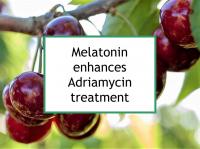Melatonin is a hormone that communicates information concerning environmental light conditions to the body. While known for regulating circadian rhythms, melatonin also has anti-cancer properties. Now a new study has explained how melatonin enhances the treatment effects of doxorubicin in breast cancer cells.
Anticancer activities of melatonin
Melatonin influences the expression of genes involved in cell proliferation, immune response, adhesion, apoptosis (programmed cell death), aromatase activity (conversion of androgens to estrogens), cell cycle progression, and angiogenesis (new blood vessel formation) in ways that have chemopreventive effects. For example, melatonin has been shown to reduce the estrogen available to tumors by reducing estrogen production in normal breast cells near cancer cells. Melatonin also induces the expression of tumor suppressor genes.
Melatonin can reduce the viability of both hormone receptor positive (ER+/PR+) and triple negative (ER-/PR-/HER2-) breast cancer cells, including breast cancer stem cells. Melatonin has also been shown to sensitize ER+/PR+ breast cancer cells to the treatment effects of radiotherapy by inhibiting proliferation, inducing cell cycle arrest, and down-regulating proteins involved in DNA repair. In addition, melatonin has been found to increase the anticancer effects of docetaxel and doxorubicin in breast cancer cells, and to reduce the heart damage (cardiomyopathy) induced by doxorubicin. On the other hand, disturbances in nocturnal melatonin production caused by exposure to dim light at night have been found to render tumors insensitive to both doxorubicin and tamoxifen in animal models of breast cancer.
Melatonin-rich foods
Women can maintain their melatonin levels by getting enough sleep, avoiding night shift work and any regular light exposure during sleep (including power light indicators, electronic clock faces and visual displays), and consuming melatonin-rich foods. The foods below are good sources of melatonin and have also been found to be associated with reduced breast cancer risk or recurrence:
Sweet corn and rolled oats also contain some melatonin. On the other hand, red meat consumption has been shown reduce circulating melatonin.
Melatonin supplements normally are taken to aid sleep or as part of an anti-aging regimen. Although such supplements have been shown to be effective in increasing circulating melatonin levels, there have been no studies concerning the impact of such supplementation on breast cancer risk or breast cancer recurrence in women. One study reported that while mice given melatonin in their drinking water from age six months onwards lived longer than untreated control mice, they also developed more tumors. Safe and effective dosages of melatonin for breast cancer survivors have not been established.
Latest research explains how melatonin potentiates doxorubicin
The study referenced above was designed to investigate the mechanism of action by which melatonin increases the cytotoxic treatment effects of doxorubicin in breast cancer cells without harming normal cells. In the study, the authors determined that melatonin acted synergistically with doxorubicin to induce programmed cell death of both ER+/PR+ and triple negative breast cancer cells by reducing the expression of AMP-activated protein kinase α1 (AMPK α1). AMPK α1, which is involved in cell migration, induction of cell cycle arrest, and apoptosis, acts as a critical survival factor for cancer cells.
The authors additionally determined that the synergistic effects of melatonin plus doxorubicin treatment also held in a variety of other cancer cell types. Furthermore, melatonin was found to be highly effective in inducing cancer cell death when combined with other chemotherapy drugs, including cisplatin, 5-fluorouracil (5-FU), irinotecan, and sorafenib. AMPKα1 expression was lessened in each of these cases. The authors conclude that reducing AMPKα1 appears to be an effective strategy for increasing the sensitivity of cancer cells to treatment with doxorubicin.
